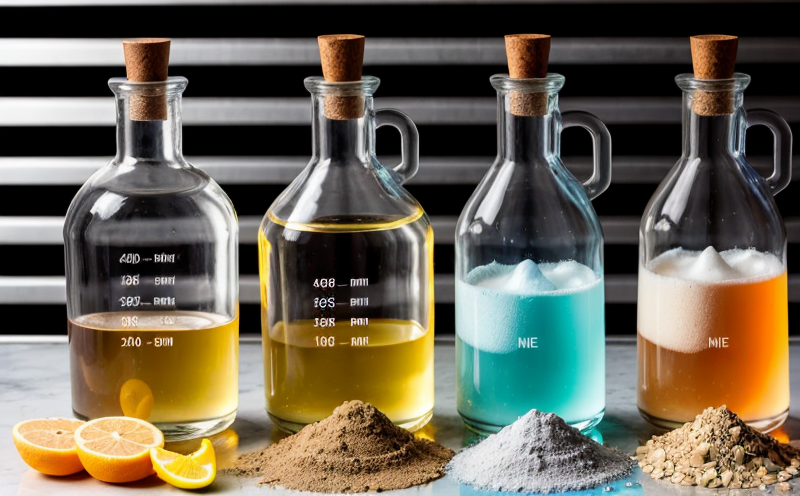SAE J2289 Electrolyte and Chemical Testing of EV Battery Modules
The SAE J2289 standard is a critical component in the quality assurance process for electric vehicle (EV) battery modules. This standard outlines procedures to test electrolytes and chemicals within lithium-ion batteries, which are central to the performance and safety of modern EVs. Compliance with this standard ensures that the chemical composition and integrity of the electrolyte meet stringent safety and performance criteria.
Battery health is paramount in ensuring the longevity and reliability of an electric vehicle. Electrolytes play a pivotal role in maintaining optimal battery performance by facilitating ion transport during charge-discharge cycles. The SAE J2289 standard provides specific protocols for testing these electrolytes, including their concentration, purity, and stability over time.
Testing electrolyte properties is not just about ensuring the safety of the vehicle; it also helps in optimizing battery efficiency and extending its operational life. By adhering to SAE J2289 standards, manufacturers can ensure that their products meet or exceed regulatory requirements, thereby building consumer trust and satisfaction.
Our laboratory offers comprehensive testing services for EV battery modules according to the SAE J2289 standard. Our state-of-the-art facilities are equipped with advanced analytical instruments capable of providing precise measurements and reliable data. This ensures that we can accurately assess electrolyte properties, identify potential issues early on, and provide actionable insights.
| Test Parameter | Description |
|---|---|
| Battery Temperature | Temperature is a critical factor in electrolyte performance. This test ensures that the battery operates within specified temperature ranges. |
| pH Level | The pH level of the electrolyte directly impacts its chemical stability and overall battery performance. |
| Electrolyte Concentration | This test verifies that the concentration is within acceptable limits to ensure efficient ion transport. |
| Dissolved Contaminants | We check for any impurities or contaminants in the electrolyte, which could degrade battery performance over time. |
| Specific Gravity | This test measures the density of the electrolyte relative to water at a specific temperature. |
Benefits
- Enhanced Safety: Ensures that lithium-ion batteries meet strict safety standards, reducing the risk of fire or explosion.
- Precise Performance Optimization: Identifies potential issues early on, allowing for targeted improvements in battery efficiency and lifespan.
- Regulatory Compliance: Meets stringent regulatory requirements, ensuring compliance with international standards like SAE J2289.
- Consumer Trust: Demonstrates a commitment to quality and reliability, building trust among consumers.
Quality and Reliability Assurance
The process of testing electrolytes in EV battery modules is highly technical and requires meticulous attention to detail. Our team utilizes advanced analytical techniques such as gas chromatography, Fourier-transform infrared spectroscopy (FTIR), and ion chromatography to perform these tests accurately.
Our laboratory adheres strictly to the SAE J2289 standard, ensuring that all tests are conducted under controlled conditions. This includes temperature-controlled environments for accurate pH measurement and precise calibration of analytical instruments. Our expertise lies in interpreting test results effectively and providing actionable insights to our clients.
We provide detailed reports that not only document the test parameters but also offer recommendations based on the findings. These reports are crucial for quality managers, compliance officers, R&D engineers, and procurement teams involved in the development and maintenance of EV battery modules.
Use Cases and Application Examples
- Quality Assurance: Testing electrolytes ensures that batteries meet stringent performance and safety standards before being incorporated into electric vehicles.
- R&D Innovation: Understanding the chemical composition of electrolytes helps in developing new, more efficient battery technologies.
- Compliance: Ensures adherence to international standards like SAE J2289, which is essential for regulatory compliance and market entry.
The following use cases highlight the importance of our services in various industries:
- Automotive Manufacturers: Our tests are crucial for validating the safety and performance of battery modules used in electric vehicles. This ensures that these components meet or exceed industry standards.
- R&D Facilities: We support research and development by providing data on electrolyte properties, which can be used to improve existing technologies or develop new ones.
- Regulatory Bodies: Compliance with international standards is essential for market entry. Our testing services help ensure that products meet these requirements.





